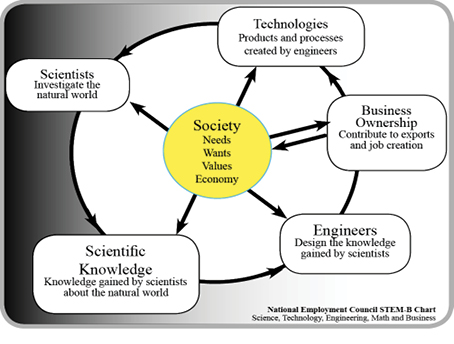
Our Youth Are Our Future. Will they have the tools to succeed?
Why is preparing our youth in Science, Technology, Engineering and Math important to our economy?
When students in Kinder Garden today graduate in 11 years, will they possess the tools to become successful members of our society? It is our responsibility to ensure that our children are prepared to lead our country in the 21st Century and compete in the global market.
The ability to innovate products and services that are valued globally is essential to the future of our economy as they contribute to exports and eventually jobs. To accomplish this it is important that we provide our children an education that includes a solid foundation in science, technology, engineering and mathematics (STEM). It is equally important that our youth value innovation and acquire education in operating a business.
The opportunity cost for not addressing this challenge is too high for our country to ignore. For a society so deeply dependent on technology and engineering, our youth is inherently unaware of its benefits or its value.
Being unclear of its value, students may never develop the ambition to pursue a path in areas of STEM.
In the U.S. this year, Approximately 1.25 million kids leave school without a high school diploma … that's about 7,000 students a day! The national Science Board reported in 2011 that the U. S. is currently experiencing a chronic decline in homegrown STEM talent and is increasingly dependent upon foreign scholars to fill the voids.
Consequences of doing nothing!
By 2018, if current trends continue, more than 90 percent of all scientists and
Engineers will live in Asia. In 2005, only 8% of all degrees awarded in the U.S. were in engineering, mathematics or the physical sciences*.
Currently the U.S. ranks 20th internationally based on our share of graduate degrees awarded in engineering, computer science, and mathematics.
Since the 1960s, the demand for skills has changed dramatically as the demand for routine manual skills have declined.
Department of Labor shows that 15 of the 20 fastest growing occupations require science or mathematics training to successfully compete for a job.
decreased.
Only four percent of American college graduates in 2003 majored in engineering compared to 13 percent of European students and 20 percent of those in Asia.
If students continue to pursue degrees and careers in fields other than STEM related
areas, the U.S. will find it difficult to compete in the global economy. Further,
the U.S. will not be able to meet its future workforce needs.
The U.S. needs
400,000 new graduates in STEM fields by 2015.8 Microsoft reports that only 14%
of students graduating with bachelor's degrees in Washington state have the skills
that they need.9 Without a solid foundation in science, technology, engineering, and
mathematics, students will not be qualified for many jobs in the workplace – including
many jobs beyond traditional engineering or science-related jobs.
Job Demands Are Growing!
According to the U.S. Bureau of Labor Statistics, professional information technology (IT) jobs will increase 24% between 2006 and 2016.3 However, as jobs requiring a solid background in science, technology, engineering, and mathematics are growing – more students are choosing not to major in these areas.

* U.S. Department of Education, National Center for Education Statistics, Higher Education.
Program organized by Farhad Omidwar (Fred Omid), John Davis and Annaliza Fran.
Top
National Employment Council - All rights reserved - Copyright 2016